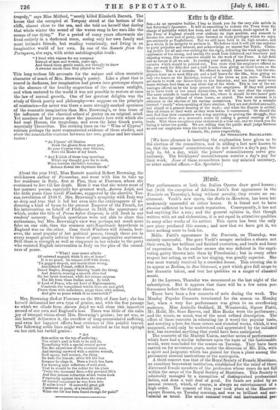Ditrr tu tyr itar.
Sut—As an operative builder, I beg to thank you for the very able article in last Saturday's Spectator. It will do something to redeem the Press from the charge of partiality which has been, and not without cause, made against it. If the Press of England should ever abdicate its high position, and consent to become the mere tool of party, then farewell to those privileges which we enjoy pre-eminently as Englishmen. But we still have faith in its high mission, and as a whole, in its integrity to perform it. We believe that it will yet rise superior to party prejudice and interest, and acknowledge no master but Truth. Claim- ing justice for all and ever striving for the right, defending the weak against the oppression of the strong, and tearin'g the mask from falsehood and treachery and exposing wrong, this we conceive should be the work of the Press. A fair field and no favour is all we ask. In reading your article, I perceive one or two inac- curacies which should be pointed out. You state that the employers offered us 33s. per week for fifty-five and a half hours, thus giving us three hours on the Saturday. This is a mistake. We offered to accept those terms, but the em- ployers want us to work fifty-six and a half hours for the 33s., thus giving us only two hours on the Saturday, instead of the three as you state. Thus we are made to work our dinner-hour on the Saturday, and are kept many more hours without food than on any other day of the week. This is one of the ad- vantages offered us by the hour system of the employers. If they will permit us to leave work at our usual dinner-time, we will at once close the contest. The same mistake is made under head 4th, where it should be two hours' gain on the Saturday instead of three hours, as stated. The neat mistake is in reference to the election of the various committees. You have by a mistake inserted "yearly" when speaking of their election. They are not elected annually, but simply at a general meeting of the trade ; and when the dispute is settled, they all return to their work as they were before it commenced. Or should the men find that their committee was doing anything to prolong the struggle, they could remove them at a moment's notice by calling a general meeting of the trade. With these exceptions your statement is a true one, and we thank you for laying it before the public. We are willing that the public shall judge between us and our employers when the truth is before them.
I remain, Sir, yours respectfully, AN OPERATIVE BRICKLAYER.
We have pleasure in inserting the explanation here given as to the election of the committees, and in addi g a fact now known to us, that the masons' committeemen do not receive a day's pay, but only is. 6d. a day., while the joiners' committeemen serve gra- tuitously. The bricklayers' committeemen receive a day's pay for their work. None of these committees have any salaried secretary, or other salaried officer.—En. Spectator.]






























 Previous page
Previous page